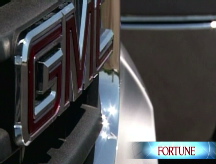GM-Chrysler: Stuck in neutral
Talks of a GM-Chrysler merger continue, but experts doubt the companies will find the savings, financing and union-backing necessary to close a deal.
NEW YORK (CNNMoney.com) -- General Motors and Chrysler both find themselves in too much trouble not to look at a deal. But those same troubles could make a combination too difficult to pull off.
The two battered automakers are reported to be in talks about joining operations in order to cut billions in overlapping expenses.
Experts say both companies need to consider such a radical move as a way to stop the bleeding. GM (GM, Fortune 500) has only about $21 billion in cash and Chrysler has $11 billion, although most of that was borrowed.
This may sound like a lot of cash but given declining auto sales and rising losses, both companies could run into cash shortages as soon as next year, according to credit rating agency Standard & Poor's.
"They are looking at some can-we-live-until-tomorrow questions," said David Cole, chairman of the Center for Automotive Research.
Officials with the two companies wouldn't publicly comment on the widespread merger reports. But sources with knowledge of the situation confirm such discussions are taking place.
"We talk to people all the time. In times like this, when markets get the way they are, there are opportunities out there," said an executive with one of the firms.
So what might happen if GM and Chrysler were to turn Detroit's Big Three (Ford Motor (F, Fortune 500) is the other) into the Big Two?
Analysts say a deal could lead to the end of some of the most storied automotive brands in the world.
Of the three brands that make up Chrysler LLC -- Chrysler, Dodge and Jeep, only the Jeep brand is considered a strong one. GM's Buick, Pontiac and GMC brands are also considered troubled.
So which brands are kept, which ones go away are part of a merger will be one of the difficult questions to work out.
But that's only one of the tough tasks that executives of a combined GM and Chrysler would face. Even if an agreement on a deal can be reached, most experts caution that ringing the necessary savings will prove difficult if not ultimately impossible.
"It's easy to calculate the cost reductions on paper. It pencils outs very well. But it's immensely challenging to execute," said auto industry consultant John Casesa of Casesa Strategic Advisors.
The combination could also face strong opposition from two powerful constituencies - the United Auto Workers union and the companies' dealers.
UAW President Ron Gettelfinger, who just last year negotiated cost-saving labor agreements with both companies as well as Ford, told reporters in Michigan on Friday that he knows the companies have been holding discussions for a long time and that the union is very concerned such a move would result in another round of deep job cuts.
Casesa said the only way the deal makes sense is if GM takes the $11 billion in cash that Chrysler has on hand and uses it to close most of the additional capacity and dealerships it acquires as part of the deal, shut plants, buy out hourly workers and pay severance to nonunion staff. Staff cuts at the combined companies could approach the 66,000 now on Chrysler's payroll, he said.
"You eliminate some capacity in the market and a competitor. That I think is the appeal," he said. But he said the steps needed to close factories and dealerships would eat up most of Chrysler's cash. So there is limited advantage to GM taking all these difficult steps.
"GM is already on a path today to be much more competitive. What it lacks is the capital to give it staying power to complete the plan," said Casesa.
Bob Shulz, S&P's senior automotive credit analyst, also questions whether the deal would significantly help the cash outlook of the combined company.
"We're skeptical about how it helps them in the short run, given the state of the capital market," said Shulz. "A deal probably requires them to spend more cash in the short-term."
Raising the money needed to do a deal in these locked-up credit markets would probably be close to impossible, according to one strategist.
"It's difficult enough getting money for good deals that show immediate earnings growth. To get the funding to do a deal in auto industry takes an enormous leap of faith," said Art Hogan, chief market analyst at Jefferies & Co.
But because of this need for upfront cash, some are predicting the two automakers will make an appeal for merger-related funding directly to the federal government.
That would be in addition to the $25 billion in loans that Congress approved in this year's energy bill to help GM, Chrysler and other automakers shift to making more fuel efficient cars.
"I believe the federal government has already decided they can not have a failure of significance in this business," said Cole. He said that a failure at a major automaker would have a huge impact on the broader economy, with 10 more jobs being lost in related industries for every job lost on an auto assembly line.
"The cost of cleaning up a collapse of an automaker is a lot greater than preventing it from occurring," he said.
But it's questionable that the government would approve financing for a deal that could eliminate additional jobs in the short-run at a time of rising unemployment.
And the state of the Detroit automakers is so precarious there are many who wonder whether Washington can afford to take a risk and pump money into the firms, especially since the government is also spending hundreds of billions to bail out the banking sector.
"This is not Lee Iacocca's Chrysler," said University of Maryland Professor Peter Morici, referring to the former Chrysler boss, who won federal loan guarantees to save the company in the 1970s. "That company was savable. These are not. They're not going to get fixed by just giving them money. And pretty soon we're going to run out of money to give out."
Cole argues that the reduction in capacity that would take place in a deal, coupled with savings from lower research and development costs, could help a combined GM-Chrysler return to profitability.
He added that even the UAW won't block a move to close plants and buyout more workers if it's what is needed to ward off bankruptcy.
"What labor has to have more than anything else is a competitive profitable company over the longer term," Cole said. "They'll not stand in the way if this really helps out."
But others doubt that even a leaner combined GM-Chrysler will be well positioned for a market for autos that could stay soft into 2010.
"The fact that it's gotten this far makes me think it might actually happen. But there are so many issues to deal with, it'll be tough to sell to the boards, the unions, the dealers. It'll be a tough merger to pull off," said Bob Schnorbus, chief economist with J.D. Power & Associates. ![]()



